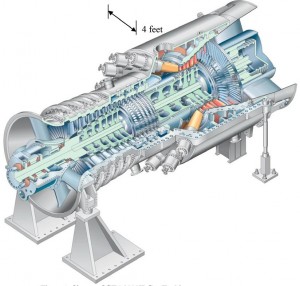Background
Siemens Energy, along with numerous partners, has an ongoing U.S. Department of Energy (DOE) program to develop hydrogen turbines for coal-based integrated gasification combined cycle (IGCC) power generation that will improve efficiency, reduce emissions, lower costs, and allow for carbon capture and storage (CCS). Siemens Energy is expanding this program for industrial applications such as cement, chemical, steel, and aluminum plants, refineries, manufacturing facilities, etc., under the American Recovery and Reinvestment Act (ARRA). ARRA funding will be utilized to facilitate a set of gas turbine technology advancements that will improve the efficiency, emissions, and cost performance of turbines for industrial CCS. ARRA industrial technology acceleration, application, and adaptation will also benefit advanced hydrogen turbine development and existing machines in typical utility applications.
This project is managed by the DOE’s National Energy Technology Laboratory (NETL). NETL is researching advanced turbine technology with the goal of producing reliable, affordable, and environmentally friendly electric power in response to the nation’s increasing energy challenges. With the Hydrogen Turbine Program, NETL is leading the research, development, and demonstration of these technologies to achieve power production from high hydrogen content fuels derived from coal that is clean, efficient, and cost-effective, minimizes carbon dioxide (CO2) emissions, and will help maintain the nation’s leadership in the export of gas turbine equipment.
Project Description
Under the ARRA funded program, Siemens Energy will focus on advancing state-of-the art large natural gas fired turbine technology to produce turbines specifically designed for operation on hydrogen and syngas fuels derived from industrial processes that capture a large percentage of CO2. Advanced technologies and concepts will be evaluated, down selected, and validated. The advanced technologies, component designs, and manufacturing processes will be developed and verified in sub-scale and full-scale tests and process verifications to demonstrate that the program goals can be achieved. Some of the key enabling technologies needed are as follows:
• Fuel-flexible, ultra low NOX, long-life combustion system operating at the increased firing temperatures needed to achieve high efficiency. Siemens will work to develop a premixed combustion system capable of operating on hydrogen fuel at high temperatures with minimal dilution flow. As part of this development, modeling tools for thermal acoustics and computational fluid dynamics will be adapted for hydrogen fuels and validated with test data. The primary path for the hydrogen combustor is a modification of the current Siemens premixed natural gas burner to operate on hydrogen. In addition, as risk mitigation, several alternative combustion technologies will be evaluated to determine if they can provide an improvement for high-temperature hydrogen operation.
• Development and optimization of higher temperature material system (base alloy, bond coat, and thermal barrier coatings [TBCs]) capabilities that allow operation in challenging environments, thus ensuring that the turbine components achieve high reliability and long life.
• Advanced manufacturing processes and techniques essential to producing the novel turbine cooling schemes that are being pursued in this program. Siemens will be producing full-sized engine parts using advanced core making technology, performing investment casting trials, conducting destructive and non-destructive evaluations, machining prototype parts using a proposed production process and conducting full-scale engine testing on final products.
• New sensors and diagnostics to allow more efficient, fuel-flexible, and safe gas turbine operation. Customer interviews determined key sensing needs and sensor specifications for these needs. Based on these results, Siemens will work with sensor vendors to design, develop, and validate sensor designs for engine validation or use in on-line control.
Goals/Objectives
The objective of the ARRA activity is to identify a set of gas turbine technology advancements that will improve the efficiency, emissions, and cost performance of gas turbines for industrial applications with CCS. This extension will accelerate the key technologies needed to significantly improve the efficiency of gas turbines in industrial applications, apply these technologies to the advanced hydrogen turbine, and adapt to existing turbine frames as applicable.
Government funding for this project is provided in whole or in part through the American Recovery and Reinvestment Act.
AWARD NUMBER: DE-FC26-05NT42644
